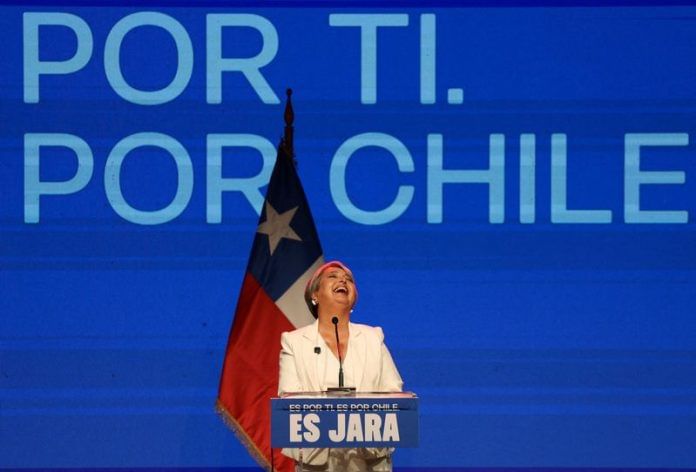By Alexander Villegas and Fabian Cambero
SANTIAGO (Reuters) -Far-right candidate Jose Antonio Kast is favored to clinch a runoff victory next month despite lagging slightly behind governing coalition candidate Jeannette Jara in Chile’s first-round presidential vote on Sunday.
With nearly all ballots tallied, Jara, the first Communist Party member to be a finalist for the Chilean presidency, was holding 27% of the vote versus 24% for Kast, a tight margin that underscored deep political divisions.
An eventual win for Kast would put in place an administration that is further to the right than any other since the Pinochet dictatorship.
A December 14 runoff will pit those two ideological extremes against each other, as many voters signaled that they were prioritizing crime and immigration over the progressive reforms that defined the last election.
“Change will come,” Kast told supporters on Sunday evening, adding that a “real victory” would come when authorities defeat organized crime, close the borders to undocumented migrants and fix an overburdened healthcare system.
Chile’s rightward tilt would mirror recent leftist defeats across Latin America and it signals growing momentum for right-wing candidates in Colombia, Peru and Brazil, where security fears also loom as key issues. It may also offer the Trump administration an opportunity to build upon the alliances it has forged with rightist governments in Argentina, Ecuador and El Salvador.
In a sign of popular revolt against the status quo, Franco Parisi, of the center-right Party of the People who proposed installing land mines along parts of the northern border to deter migrants, bucked poll estimates by landing in third place.
Parisi was supported by working-class men from Chile’s mining-heavy north – many of them leery of elites and traditional political parties who will likely now opt for Kast given security and employment concerns – and they may push Chile closer to U.S. President Donald Trump, said Claudio Fuentes, a political science expert at Chile’s Diego Portales University.
“Kast will move closer to the right-wing axis of the region and probably establish a close relationship with Trump,” Fuentes said.
Chile is the world’s largest copper miner and a major provider of lithium, a key metal in electric batteries, making it a potentially useful ally for the U.S., though China remains its dominant trading partner.
Votes for the four right-wing candidates in the first round reached over 70% combined, which should put Kast in a strong position for the second round, assuming most of their voters migrate to him.
Libertarian congressman Johannes Kaiser, who had looked to be in contention to be the conservative standard-bearer, and moderate-right politician Evelyn Matthei, both said they supported Kast as voting results came in.
“If you add up the votes for Kast, Matthei, and Kaiser … it’s very difficult for Jara to really make a comeback in the second round,” said Claudia Heiss, a government expert at the Universidad de Chile.
The dominance of law-and-order issues has marked a drastic change from the wave of left-wing optimism and hopes of drafting a new constitution that brought current President Gabriel Boric, who isn’t allowed to run for reelection, to power.
OPPOSITE ENDS OF POLITICAL SPECTRUM
Kast, 59, won a second chance with many voters who rejected him in 2021 for being too extreme. He has proposed building a border wall with trenches, expelling all undocumented migrants and deploying the military to high-crime neighborhoods.
“You can ask all the neighbors, even in a small town … whether they feel safe or not. And most people will tell you they are afraid,” he said after voting in his hometown of Paine, south of Santiago.
A Catholic with nine children, Kast has been criticized over his late father’s Nazi party membership and his affinity for Augusto Pinochet, the brutal dictator who led the country from 1973 to 1990. His brother, Miguel Kast, was a minister and head of the central bank during the dictatorship.
Pia Tarifenos, a 37-year-old nutritionist waving a Chilean flag outside Kast’s party headquarters in Santiago, said she felt represented by his values, adding that she believed Kast’s third bid would be different from his previous attempts.
“This time will be different because the majority of Chileans need a change,” she said. “We know the current government never delivered on its promises.”
Jara, 51, a former labor minister under Boric, has downplayed her Communist Party ties and has proposed increasing the minimum wage while boosting funding for social welfare and health care. She has also advocated for stronger gun controls, technological surveillance on the border and lifting banking secrecy laws to pursue organized crime groups.
Despite accomplishments including passing a long-awaited pension reform, she has also faced criticism for a sticky unemployment rate which currently stands at 8.5%.
(Reporting by Alexander Villegas and Fabian Cambero, additional reporting by Daina Beth Solomon and Sarah Morland in Santiago; Editing by Alistair Bell, Andrew Heavens, Christian Plumb and Diane Craft)
Disclaimer: This report is auto generated from the Reuters news service. ThePrint holds no responsibility for its content.






